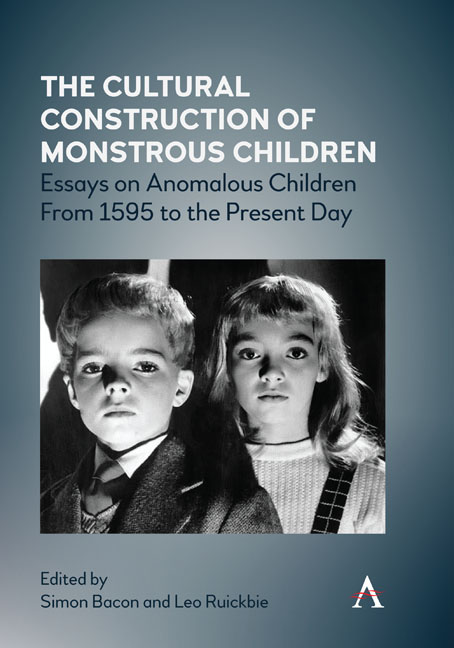 The Cultural Construction of Monstrous Children
The Cultural Construction of Monstrous Children Book contents
- Frontmatter
- Contents
- List of Illustrations
- Acknowledgements
- Introduction
- Part I Historical Case Studies
- Part II Factual Anxiety in Fictional Representations: The Undead Child
- Part III Factual Anxiety in Fictional Representations: The Monstrous Child
- Part IV Cultural Categorization in the Past, Present and Possible Future
- Notes on Contributors
- Index
Chapter Thirteen - Black-Eyed Kids and the Child Archetype
Published online by Cambridge University Press: 20 January 2022
- Frontmatter
- Contents
- List of Illustrations
- Acknowledgements
- Introduction
- Part I Historical Case Studies
- Part II Factual Anxiety in Fictional Representations: The Undead Child
- Part III Factual Anxiety in Fictional Representations: The Monstrous Child
- Part IV Cultural Categorization in the Past, Present and Possible Future
- Notes on Contributors
- Index
Summary
Introduction
Joseph Campbell once said that mythological motifs have always been the same. Things change in our culture at such a rapid pace that there is no time to develop new mythologies. Popular culture suggests that we have not necessarily changed much as a species; old anxieties have taken on new forms. Rather than new religions or myths, we talk about ‘urban legends’, a term that covers a host of stories often spread through social media of some kind. These stories are often debunked, but the messages conveyed in the stories tend to survive even if they are not factual, because they reflect culturally held ideas. In this way they resemble folk tales and perhaps more universal mythologies in some cases.
The mythical beings that hold sway in popular culture tell us something about our cultural consciousness. The prevalence of zombies and vampires in current films may reflect our fears about the mindless devouring of resources and perhaps about being nothing but mindless devourers ourselves, in a world that believes consciousness is no more than a by-product of brain chemistry. Belief in UFOs and descriptions of grey aliens and abduction experiences may reflect our fears about the unknown regions of space and the rapid pace of technology.
Since at least 1998, stories of a new mythical being have emerged on the Internet, the ‘black-eyed child’ or ‘black-eyed kid’ (BEC or BEK; henceforth known as BEKs). BEKs are children whose eyes are entirely black, with no whites or irises. They have a strange manner of speaking and are said to give off an aura of malevolence. There are some claims that BEK stories have been around much longer, but there are few consistent and detailed accounts before this time. Journalist Brian Bethel's story is often acknowledged as the first BEK story to appear on the Internet. As of this writing, Reddit has 25 threads devoted to the topic. BEK stories have appeared all over the Internet, in newspaper articles, blogs and forums. In 2011 a short film was made about Brian Bethel's encounter, and it has been the subject of radio shows and television programmes.
- Type
- Chapter
- Information
- The Cultural Construction of Monstrous ChildrenEssays on Anomalous Children from 1595 to the Present Day, pp. 205 - 216Publisher: Anthem PressPrint publication year: 2020


